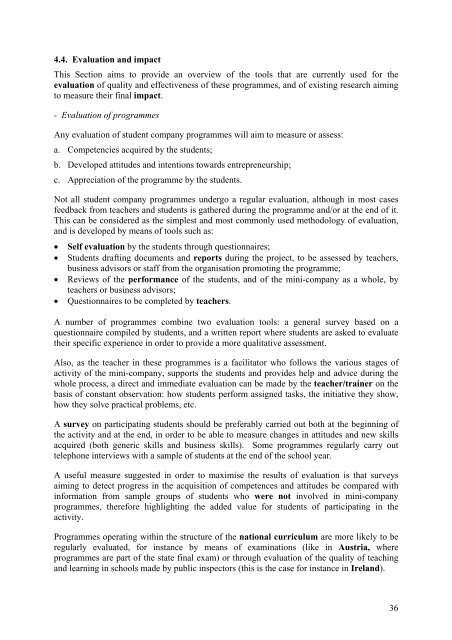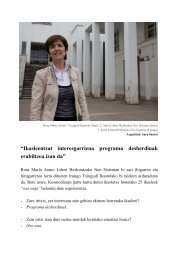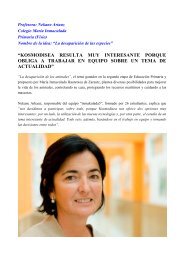Final Report of the Expert Group - European Commission - Europa
Final Report of the Expert Group - European Commission - Europa
Final Report of the Expert Group - European Commission - Europa
You also want an ePaper? Increase the reach of your titles
YUMPU automatically turns print PDFs into web optimized ePapers that Google loves.
4.4. Evaluation and impactThis Section aims to provide an overview <strong>of</strong> <strong>the</strong> tools that are currently used for <strong>the</strong>evaluation <strong>of</strong> quality and effectiveness <strong>of</strong> <strong>the</strong>se programmes, and <strong>of</strong> existing research aimingto measure <strong>the</strong>ir final impact.- Evaluation <strong>of</strong> programmesAny evaluation <strong>of</strong> student company programmes will aim to measure or assess:a. Competencies acquired by <strong>the</strong> students;b. Developed attitudes and intentions towards entrepreneurship;c. Appreciation <strong>of</strong> <strong>the</strong> programme by <strong>the</strong> students.Not all student company programmes undergo a regular evaluation, although in most casesfeedback from teachers and students is ga<strong>the</strong>red during <strong>the</strong> programme and/or at <strong>the</strong> end <strong>of</strong> it.This can be considered as <strong>the</strong> simplest and most commonly used methodology <strong>of</strong> evaluation,and is developed by means <strong>of</strong> tools such as:• Self evaluation by <strong>the</strong> students through questionnaires;• Students drafting documents and reports during <strong>the</strong> project, to be assessed by teachers,business advisors or staff from <strong>the</strong> organisation promoting <strong>the</strong> programme;• Reviews <strong>of</strong> <strong>the</strong> performance <strong>of</strong> <strong>the</strong> students, and <strong>of</strong> <strong>the</strong> mini-company as a whole, byteachers or business advisors;• Questionnaires to be completed by teachers.A number <strong>of</strong> programmes combine two evaluation tools: a general survey based on aquestionnaire compiled by students, and a written report where students are asked to evaluate<strong>the</strong>ir specific experience in order to provide a more qualitative assessment.Also, as <strong>the</strong> teacher in <strong>the</strong>se programmes is a facilitator who follows <strong>the</strong> various stages <strong>of</strong>activity <strong>of</strong> <strong>the</strong> mini-company, supports <strong>the</strong> students and provides help and advice during <strong>the</strong>whole process, a direct and immediate evaluation can be made by <strong>the</strong> teacher/trainer on <strong>the</strong>basis <strong>of</strong> constant observation: how students perform assigned tasks, <strong>the</strong> initiative <strong>the</strong>y show,how <strong>the</strong>y solve practical problems, etc.A survey on participating students should be preferably carried out both at <strong>the</strong> beginning <strong>of</strong><strong>the</strong> activity and at <strong>the</strong> end, in order to be able to measure changes in attitudes and new skillsacquired (both generic skills and business skills). Some programmes regularly carry outtelephone interviews with a sample <strong>of</strong> students at <strong>the</strong> end <strong>of</strong> <strong>the</strong> school year.A useful measure suggested in order to maximise <strong>the</strong> results <strong>of</strong> evaluation is that surveysaiming to detect progress in <strong>the</strong> acquisition <strong>of</strong> competences and attitudes be compared withinformation from sample groups <strong>of</strong> students who were not involved in mini-companyprogrammes, <strong>the</strong>refore highlighting <strong>the</strong> added value for students <strong>of</strong> participating in <strong>the</strong>activity.Programmes operating within <strong>the</strong> structure <strong>of</strong> <strong>the</strong> national curriculum are more likely to beregularly evaluated, for instance by means <strong>of</strong> examinations (like in Austria, whereprogrammes are part <strong>of</strong> <strong>the</strong> state final exam) or through evaluation <strong>of</strong> <strong>the</strong> quality <strong>of</strong> teachingand learning in schools made by public inspectors (this is <strong>the</strong> case for instance in Ireland).36




